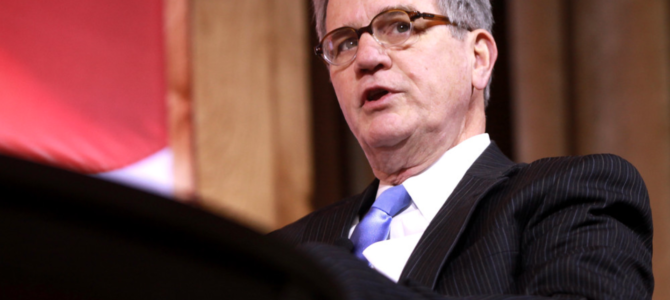It is a rare political figure who was called “the conscience of the Senate” by none other than John McCain — and also forged a working friendship with a young senator from Illinois named Barack Obama. That was Tom Coburn.
The former U.S. senator from Oklahoma, who died today at age 72, was often called the Senate’s “Dr. No,” able to jam up legislation like a committee of one. But those who knew him best knew the truth: Tom Coburn was principled, not partisan.
Dr. Coburn, as his devoted staff called him, was an equal-opportunity offender. If he disagreed with your work product, you’d cross his path — no matter your rank or party. But if he agreed, count on him to go to the mat with you — no matter your rank or party.
The late Sen. John McCain, himself known as a man of principle, once commented, “Tom has often acted as the conscience of the Senate. He can be unmovable on matters of principle when to do otherwise would harm or do no good for the country.” Unmovable indeed.
Senate Majority Leader Mitch McConnell once said Coburn may have placed more holds on legislation than any equivalent senator in history. Senate Historian Emeritus Donald Ritchie once said Coburn’s “jam-fest likely ranks as one of the most prolific in the history of the institution.” Politico was even blunter: “A typical bill moving through the Senate has a number of institutional hurdles to clear: subcommittee, committee, leadership and Coburn. It’s that last one that you won’t find in a textbook.”
Make no mistake, he wore the moniker of Dr. No proudly. He was unabashed about fighting to preserve liberty. He felt strongly about trying to prevent the next generation of Americans from being crushed under the debt of their parents’ profligate spending.
But he wasn’t partisan or even stubborn. A longtime lobbyist and friend of Coburn once wrote, “I can tell the difference between being stubborn and being committed. Senator Coburn has become a valuable member of the U.S. Senate. As one of the most conservative senators, unlike a few hard-core libertarians, Dr. Coburn understands that the U.S. Congress has a responsibility to govern.”
And govern he did, including with the Illinois senator who would go on to become president. Coburn forged an authentic friendship with President Barack Obama despite their being on different ends of the political spectrum. Peers of the same freshman class, this odd couple joined forces to pass legislation creating USAspending, giving Americans greater transparency into federal spending and providing a case study in working across the aisle.
Coburn’s principles drove him to willingly take apolitical actions. As a Republican, for example, he donated to Sen. Joe Manchin, a Democrat, because he appreciated that the West Virginia senator cared about the long-term interests of the country. Coburn also committed political malpractice by picking on his own state for pork-barrel projects and inefficient program administration.
His honesty was unvarnished during an era wherein that wasn’t the norm. He once even called a former Senate majority leader an “absolute -sshole” (and later apologized), while using that same honesty to publicly defend House Speaker Nancy Pelosi as a “nice person” when she was under attack. And he bucked his party’s special interests if the greater good was at stake — most notably by taking on Grover Norquist in the midst of negotiations on a bipartisan debt reduction package.
Coburn should be remembered for all the bills he stopped, no doubt. But he was more than just Dr. No. He was a beloved boss, colleague, and friend. That’s why dozens of senators from both parties sat to listen to his nearly 30-minute farewell speech on the Senate floor, including those outside his party, such as Sen. Chuck Schumer, who remarked that day, “I guess it would surprise the world in general to know that Tom Coburn and I are true friends, but we are. He is a man of integrity above all.”
Tom Coburn used to explain to his staff the difference between “important” and “significant.” He would constantly remind us that the work in Washington is important — have no doubt — but it is your faith, your family, and your relationships that are truly significant. Prioritize the significant at all costs, he used to say. He empowered me, a working mom in his operation, to work and not sacrifice my family. He welcomed my kids into the office, wrapped them in his arms, and gave them a Donald Duck impression that nobody would ever expect from the Senate’s Dr. No. To his team, he was the most significant of all the political figures of his time. And we loved him more on his last day than his first.







